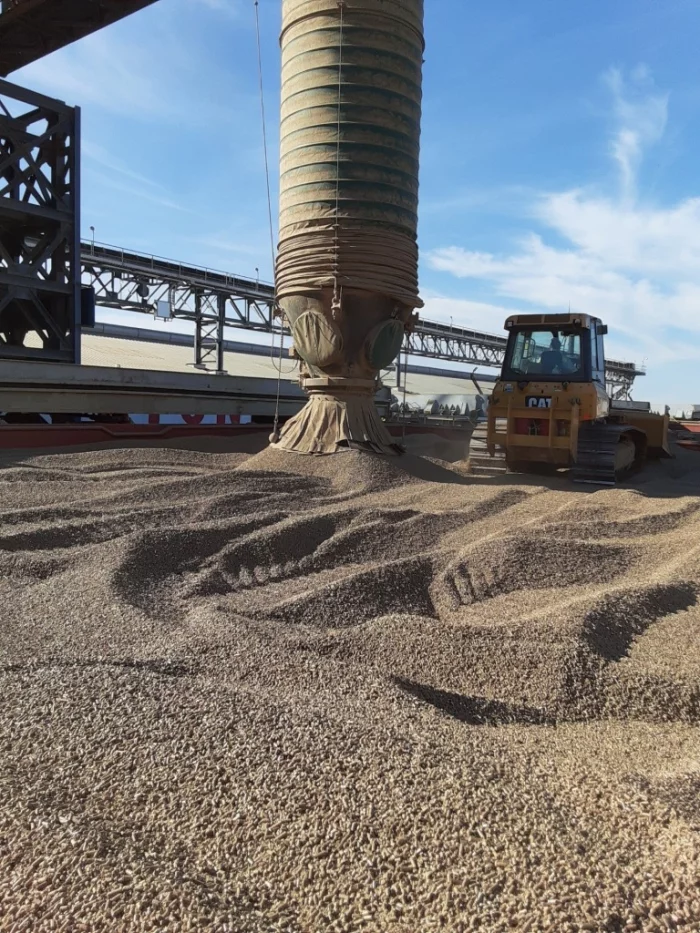

Energy diversification creates opportunities in Louisiana’s multifaceted energy industry.
Both legacy and emerging sectors positioning Louisiana to win on a global stage.
Louisiana’s robust infrastructure and skilled workforce drives innovation.
Higher education partnerships sustain Louisiana’s strong advanced manufacturing talent pipeline.
Offshore Oil Port (LOOP) handles 13% of the nation’s foreign oil
and connects by pipeline to 50% of the nation’s refining capability.
Louisiana is home to three of the United States’ seven LNG export terminals.
50,000 miles of integrated pipelines crisscross major highways, railroad & navigable state waterway
LOUISIANA ECONOMIC DEVELOPMENT
See us at ADIPEC 2026 · Booth: 7535
With unmatched infrastructure, extensive logistics, and an all-of-the-above energy strategy, Louisiana is establishing itself as a global leader in energy innovation, attracting major investments and shaping the future of energy.
Baton Rouge, Louisiana, United States
Aerospace, Defense & Security, Oil · Gas · Energy, Maritime
Products & Services
People
Other
About
Connect with us at
People

Devin Harrison
Louisiana Economic Development
Executive Director, Business Development
ADIPEC 2026

India Bellard
Louisiana Economic Development
Director, Business Development
ADIPEC 2026

Jason Lanclos
Louisiana Economic Development
Director, State Energy Development and Planning
ADIPEC 2026

Marlene Janetos
Louisiana Economic Development
Director of Engagement
ADIPEC 2026
Other Info
Louisiana is Playing an Increasingly Critical Role in the Global LNG Supply Chain
Louisiana Economic Development
Louisiana boasts four of the nation’s LNG export terminals, with more facilities planned.
Nearly 50,000 miles of integrated pipelines crisscross every major highway, railroad and navigable waterway in the state.
The state holds 6% of the nation’s natural gas reserves.
Located outside of Lafayette, the Henry Hub is a natural gas pipeline that serves as the official delivery location for New York Mercantile Exchange (NYMEX) futures contracts.
Nearly 50,000 miles of integrated pipelines crisscross every major highway, railroad and navigable waterway in the state.
The state holds 6% of the nation’s natural gas reserves.
Located outside of Lafayette, the Henry Hub is a natural gas pipeline that serves as the official delivery location for New York Mercantile Exchange (NYMEX) futures contracts.
The one-of-its-kind Louisiana Offshore Oil Port (LOOP) handles 13% of the United States' foreign oil and connects by pipeline to 50% of the nation’s refining capability.
Louisiana Economic Development
Louisiana is strategically located on the gulf, providing easy access to major shipping lanes and quick and efficient product transport to domestic and international ports.
The state is home to numerous global companies with operations in the Gulf, one of the most productive oil and gas basins in the world. Offshore activity includes drilling, production and transportation of oil and gas.
The Louisiana Offshore Oil Port is the only deepwater oil port in the nation, providing tanker offloading at a rate of 100,000 barrels of crude oil per hour. It is the largest point of entry for U.S. waterborne crude oil. Onshore, LOOP facilities include the Clovelly Dome Storage Terminal where nearly 60 million barrels of crude oil can be stored in eight underground salt caverns and 12 million barrels can be stored above ground.
Louisiana is home to two of the four storage sites that make up the U.S. Strategic Petroleum Reserve (SPR). The two Louisiana sites are capable of holding an emergency stockpile of up to 296 million barrels of crude oil.
The state is home to numerous global companies with operations in the Gulf, one of the most productive oil and gas basins in the world. Offshore activity includes drilling, production and transportation of oil and gas.
The Louisiana Offshore Oil Port is the only deepwater oil port in the nation, providing tanker offloading at a rate of 100,000 barrels of crude oil per hour. It is the largest point of entry for U.S. waterborne crude oil. Onshore, LOOP facilities include the Clovelly Dome Storage Terminal where nearly 60 million barrels of crude oil can be stored in eight underground salt caverns and 12 million barrels can be stored above ground.
Louisiana is home to two of the four storage sites that make up the U.S. Strategic Petroleum Reserve (SPR). The two Louisiana sites are capable of holding an emergency stockpile of up to 296 million barrels of crude oil.
Louisiana Leverages Pipeline Network, Partnerships to Meet Surging Hydrogen Demand
Louisiana Economic Development
Louisiana’s private sector has announced over $20 billion of hydrogen energy projects.
Key to the hydrogen industry in Louisiana is its large-scale, advanced pipe network that crisscrosses every major interstate and waterway in the state.
In 2022, Arkansas, Louisiana and Oklahoma formed a regional partnership called HALO Hydrogen Hub to develop a regional hydrogen business cluster that will produce, process, deliver and store clean hydrogen. The partnership will focus on education, outreach, research and development, project demonstrations, policy and regulatory support.
Key to the hydrogen industry in Louisiana is its large-scale, advanced pipe network that crisscrosses every major interstate and waterway in the state.
In 2022, Arkansas, Louisiana and Oklahoma formed a regional partnership called HALO Hydrogen Hub to develop a regional hydrogen business cluster that will produce, process, deliver and store clean hydrogen. The partnership will focus on education, outreach, research and development, project demonstrations, policy and regulatory support.
Legacy Energy Companies: Powering the Present, Investing in the Future
Louisiana Economic Development
Louisiana’s versatile maritime industry supports offshore activity by providing vessels to transport crews, equipment and supplies. Also included is the transportation of drilling rigs and materials such as pipes, cement and drilling fluids.
The state’s manufacturing companies also play an important role, building platforms, pipelines and other infrastructure needed for seabed extraction. Companies also provide maintenance and repair services to ensure that platforms remain in good condition and operate safely.
The offshore energy sector in Louisiana also supports a range of service industries, including catering, housekeeping and medical services. These companies provide personnel to work on the platforms and ensure that workers have access to food, lodging and medical care.
The state’s manufacturing companies also play an important role, building platforms, pipelines and other infrastructure needed for seabed extraction. Companies also provide maintenance and repair services to ensure that platforms remain in good condition and operate safely.
The offshore energy sector in Louisiana also supports a range of service industries, including catering, housekeeping and medical services. These companies provide personnel to work on the platforms and ensure that workers have access to food, lodging and medical care.
Connect with us at
About
Louisiana’s energy sector in 2025 is full speed ahead, with both legacy and emerging sectors positioning Louisiana to win on a global stage. Already a historic leader in oil and gas, the state is rapidly evolving into an international powerhouse for liquefied natural gas, and low-carbon solutions.
The year opened with two transformative LNG announcements: Venture Global’s $18 billion expansion in the southeastern corner and Woodside Energy’s $17.5 billion greenfield facility in the southwest – the largest foreign direct investment in state history. In addition, CF Industries unveiled a $4 billion investment to build the world’s largest blue ammonia facility, driving Louisiana’s emergence as a key player in high-demand fuel markets.
Together, these projects represent more than capital investment – they signal long-term confidence in Louisiana as a hub for energy production, innovation and logistics. The numbers speak for themselves: Louisiana now exports 61% of the nation’s LNG and ranks No. 7 in U.S. natural gas reserves.
Energy leaders worldwide have taken notice of Louisiana’s “all-of-the-above” strategy and its strategic advantages. With over 50,000 miles of pipelines, eight deep-draft ports, one of the world’s largest LNG export terminals, and unmatched access to the Gulf, the state is ideally positioned for global energy logistics.
But natural gas is only part of the story. Louisiana ranks among the top 10 states in crude oil imports, and is the No. 2 state for refining capacity. As one of the few states empowered to permit its own carbon sequestration wells, ideal subsurface geology and a vast pipeline network to move CO₂ efficiently, the state has everything required to lead in the deployment of carbon capture.
Louisiana’s power grid capacity and land availability are drawing interest from tech giants and energy-intensive industries, including data centers and advanced manufacturing. Global energy companies like Shell and ExxonMobil continue to invest in Louisiana, recognizing it as a state moving at the speed of business.
Through Louisiana Economic Development (LED), the state is actively cultivating investment, forging global partnerships and nurturing innovation. Excelling in every corner of the energy map – LNG, oil, renewables, carbon capture – Louisiana is the future of energy.
The year opened with two transformative LNG announcements: Venture Global’s $18 billion expansion in the southeastern corner and Woodside Energy’s $17.5 billion greenfield facility in the southwest – the largest foreign direct investment in state history. In addition, CF Industries unveiled a $4 billion investment to build the world’s largest blue ammonia facility, driving Louisiana’s emergence as a key player in high-demand fuel markets.
Together, these projects represent more than capital investment – they signal long-term confidence in Louisiana as a hub for energy production, innovation and logistics. The numbers speak for themselves: Louisiana now exports 61% of the nation’s LNG and ranks No. 7 in U.S. natural gas reserves.
Energy leaders worldwide have taken notice of Louisiana’s “all-of-the-above” strategy and its strategic advantages. With over 50,000 miles of pipelines, eight deep-draft ports, one of the world’s largest LNG export terminals, and unmatched access to the Gulf, the state is ideally positioned for global energy logistics.
But natural gas is only part of the story. Louisiana ranks among the top 10 states in crude oil imports, and is the No. 2 state for refining capacity. As one of the few states empowered to permit its own carbon sequestration wells, ideal subsurface geology and a vast pipeline network to move CO₂ efficiently, the state has everything required to lead in the deployment of carbon capture.
Louisiana’s power grid capacity and land availability are drawing interest from tech giants and energy-intensive industries, including data centers and advanced manufacturing. Global energy companies like Shell and ExxonMobil continue to invest in Louisiana, recognizing it as a state moving at the speed of business.
Through Louisiana Economic Development (LED), the state is actively cultivating investment, forging global partnerships and nurturing innovation. Excelling in every corner of the energy map – LNG, oil, renewables, carbon capture – Louisiana is the future of energy.
Add Attachment

Share
Recent Chats
Share via email
Future: handle WhatsApp here
Future: handle LinkedIn here
Future: handle Twitter here
SUBMENU HERE
Share via Chat
Copy Link

